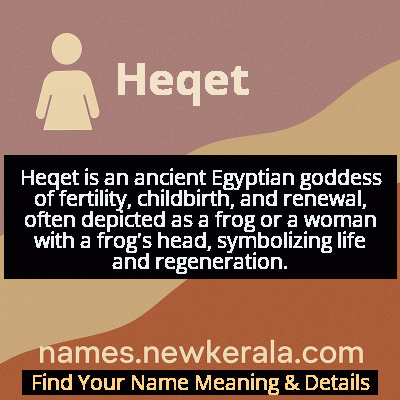Heqet Name Meaning & Details
Origin, Popularity, Numerology Analysis & Name Meaning of Heqet
Discover the origin, meaning, and cultural significance of the name HEQET. Delve into its historical roots and explore the lasting impact it has had on communities and traditions.
Name
Heqet
Gender
Female
Origin
Egyptian
Lucky Number
1
Meaning of the Name - Heqet
Heqet is an ancient Egyptian goddess of fertility, childbirth, and renewal, often depicted as a frog or a woman with a frog's head, symbolizing life and regeneration.
Heqet - Complete Numerology Analysis
Your Numerology Number
Based on Pythagorean Numerology System
Ruling Planet
Sun
Positive Nature
Leaders, ambitious, highly driven, self-reliant, innovative.
Negative Traits
Overly aggressive, domineering, impatient, selfish.
Lucky Colours
Red, orange, gold.
Lucky Days
Sunday.
Lucky Stones
Ruby, garnet.
Harmony Numbers
2, 3, 9.
Best Suited Professions
Entrepreneurs, managers, engineers.
What People Like About You
Courage, determination, leadership.
Famous People Named Heqet
Heqet
Ancient Egyptian Goddess
Primary deity of childbirth and fertility, worshipped throughout ancient Egyptian history
Heqet Priestess of Antinoöpolis
Religious Leader
High priestess who oversaw fertility rituals and childbirth ceremonies in the temple of Heqet
Heqet-nofret
Royal Midwife
Personal midwife to Queen Sobekneferu, credited with developing advanced birthing techniques
Name Variations & International Equivalents
Click on blue names to explore their detailed meanings. Gray names with will be available soon.
Cultural & Historical Significance
In temple mythology, Heqet was intimately involved in the divine conception and birth of pharaohs, particularly in the Osiris myth where she assists in the posthumous conception of Horus. This established her as a guardian of royal lineage and legitimacy. Midwives and obstetric practitioners would invoke her name during deliveries, and women in labor wore Heqet amulets for protection. Her cult centers, particularly at Antinoöpolis, attracted pilgrims seeking fertility blessings. The goddess also appeared in funerary texts like the Pyramid Texts and Coffin Texts, where she helped the deceased pharaoh be reborn in the afterlife, demonstrating her dual role in both earthly birth and spiritual resurrection. This comprehensive domain over life's most critical transitions made Heqet one of Egyptian religion's most enduring and beloved deities.
Extended Personality Analysis
Those named Heqet often embody characteristics reflecting their namesake's divine attributes, particularly nurturing strength and transformative resilience. They typically display exceptional empathy and intuitive understanding of others' needs, making them natural caregivers and healers. Like the frog that can live in multiple environments, Heqet-named individuals demonstrate remarkable adaptability, moving gracefully between different social contexts and life circumstances. They possess an innate understanding of natural cycles and timing, often exhibiting patience in allowing processes to unfold organically rather than forcing outcomes.
Their personality combines practical wisdom with spiritual depth, enabling them to guide others through significant life transitions. The protective aspect of the goddess manifests as fierce loyalty to loved ones and a strong sense of responsibility toward those in their care. These individuals often show creative problem-solving abilities, particularly in situations requiring them to 'midwife' new projects or ideas into being. Their connection to water symbolism gives them emotional intelligence and the ability to navigate complex feelings, both their own and others'. While they may appear gentle, they possess inner strength that emerges during challenges, much like the goddess who presided over the dangerous but miraculous process of childbirth. This combination of tenderness and resilience makes them invaluable in supportive roles and leadership positions alike.
Modern Usage & Popularity
Heqet remains an exceptionally rare given name in contemporary society, primarily used by parents with specific interests in Egyptian mythology, archaeology, or pagan spiritual traditions. Its usage has seen minimal but steady presence in academic families and those connected to Egyptian cultural heritage. The name appeals to modern parents seeking unique mythological names that carry deep historical significance and positive associations with life and creation. While it doesn't appear on official baby name registries due to its rarity, online parenting forums and mythology enthusiast communities occasionally feature discussions about the name. Its modern appeal lies in its distinctive sound, rich background, and the empowering symbolism of a female deity associated with life-giving powers. The name has found some traction in neopagan and Wiccan communities where ancient deities are honored through naming practices. However, its unusual nature and specific cultural origins mean it's unlikely to become mainstream, preserving its status as a distinctive choice for parents wanting a name that tells a story and connects their child to ancient wisdom traditions.
Symbolic & Spiritual Meanings
Heqet's symbolic meanings encompass a rich tapestry of life-affirming concepts rooted in natural cycles and transformative power. As a frog deity, she represents the profound mystery of metamorphosis—the ability to completely transform one's state of being while retaining essential identity. This symbolism speaks to human capacity for personal growth, spiritual evolution, and rebirth after challenging periods. Her connection to the Nile's annual flooding positions her as a symbol of abundance and regeneration, reminding us that endings often precede new beginnings. The frog itself carries multiple symbolic layers: its aquatic nature represents emotional depth and intuition, while its terrestrial life signifies practical grounding and adaptation.
Metaphorically, Heqet embodies the sacred feminine principle of creation—not just biological childbirth but the birthing of ideas, projects, relationships, and new phases of life. She symbolizes the protective energy that safeguards vulnerable new beginnings and the ancient wisdom that understands life's interconnected rhythms. In broader spiritual contexts, Heqet represents the bridge between physical and spiritual realms, much as she assisted both in earthly births and afterlife transitions in Egyptian belief. Her symbolism encourages embracing change as a natural, life-giving process and recognizing the sacred in everyday miracles of growth and renewal. This comprehensive symbolic framework makes Heqet's name carry meanings relevant to contemporary spiritual seekers while honoring its ancient origins.

